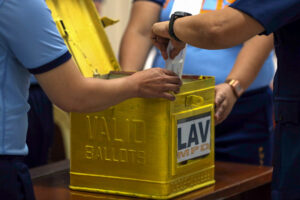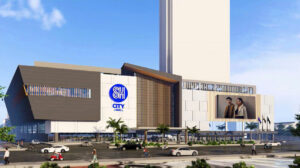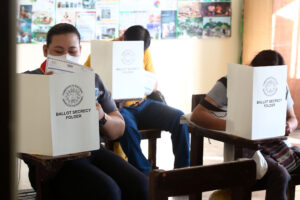Elections are always a critical juncture in a nation’s history

Filipinos only have a few remaining days before the elections on May 12. By this time, we should already have a firm idea, if not a working list, of whom we are going to elect for the various posts that are waiting to be filled.
The candidates for both national and local posts have made their respective pitches, highlighting their good points, and projecting themselves as the best choice for the job. The question is, should we the voters simply buy into their rhetoric?
Elections have always been both a definitive time and a critical juncture for Filipinos. This year’s polls stand out because of three main issues: Economic challenges, political divisions, and massive disinformation.
According to a survey by the Social Weather Stations, nine out of 10 Filipinos will support candidates who advocate for job creation, healthcare, food security, education, and affordable prices of goods and services. These issues reflect the deep economic concerns that continue to shape voter preferences.
Jobs remain the top advocacy, with 92% of respondents prioritizing candidates who push for employment opportunities. This preference stems from the understanding that stable work ensures income to support families. Similarly, healthcare advocacy garners strong support (91%), as the high cost of medical treatment remains a burden for many. Food security, education, and controlling inflation also rank high, reflecting the urgent need for solutions to rising food prices, access to quality education, and the increasing cost of living.
The survey underscores the persistent struggles of many Filipinos with everyday needs. We are seeing that traditional campaign issues such as the fight against illegal drugs and corruption no longer dominate voter preferences. This shift signals a growing demand for candidates to address tangible, everyday concerns rather than relying on rhetoric or sensationalized platforms. Thus, candidates need to show they are capable of providing long-term solutions to these struggles.
Among those in the running, most administration-supported senatorial candidates are in the projected winning circle. Nine of these candidates continue to lead, showcasing the strategic advantages of incumbency, name recall, and access to government machinery. This dominance reflects the power of established networks and media leverage in shaping voter preferences.
But there is another aspect that Filipinos are considering: SWS says a resounding 75% of respondents prefer candidates who advocate for asserting the Philippines’ sovereignty against China’s aggressive actions in the West Philippine Sea. This overwhelming majority underscores the public’s desire for leaders who prioritize national interests and stand firm against Beijing’s encroachment.
However, the survey also highlights a concerning trend: 41% of those who favor non-assertive candidates belong to Social Class E, the country’s most vulnerable sector. This could likely be attributed to China’s systematic disinformation campaign, which targets the poorest Filipinos, distorting narratives and undermining public trust. Tragically, the daily struggles of Social Class E leave them more susceptible to manipulation, especially when amplified by local politicians with a history of favoring Chinese interests.
These disinformation efforts are being weaponized by political actors ahead of the elections, exploiting the aspirations of the poor with false promises and hollow rhetoric. This betrayal of the Filipino people, particularly the most vulnerable, threatens the nation’s sovereignty and future.
Indeed, the prevalence of fake news in the Philippines has reached alarming levels, as highlighted by the latest SWS survey commissioned by the Stratbase Group. With 59% of Filipinos identifying fake news on social media platforms like Facebook, X (formerly Twitter), YouTube, and TikTok as a “serious” problem, and 62% expressing similar concerns about traditional media such as TV, radio, and newspapers, the issue is undeniably pervasive.
Some 65% of Filipinos admit struggling to distinguish real from fake information, underscoring the challenge of navigating a media landscape rife with disinformation. This difficulty is compounded by the fact that 55% of respondents frequently encounter fake news, whether “often” or “sometimes,” across both traditional and social media platforms.
These dangers are magnified as we near the elections because disinformation manipulates public opinion, distorts democratic choices, and enables corrupt forces to maintain power. Sinister actors will exploit misinformation to sway votes, urging Filipinos to remain vigilant, verify sources, and think critically before believing or sharing news. Those pushing pro-China narratives will stop at nothing to spread disinformation, silence critics through trolling, and amplify divisive content to shape public opinion and political agendas. These activities not only distort public discourse but also suppress meaningful participation in critical issues like the West Philippine Sea.
The demonization of mainstream media began during the Duterte administration, coupled with the demolition operations of well-funded online troll armies to erode public trust in credible news organizations. Despite this, news organizations persist, mindful of their duty to speak truth to power and inform the public of their options.
All these challenges taken together make Monday’s elections especially crucial for Filipinos and the nations. Voters must make sure that they do not fall prey to the machinations of others who seek to win their hearts and minds for personal gain. We must reject disinformation, and recognize that political agendas must give way to economic solutions. Ultimately, it is the betterment of the lives of the people at stake.
Victor Andres “Dindo” C. Manhit is the president of the Stratbase ADR Institute.




